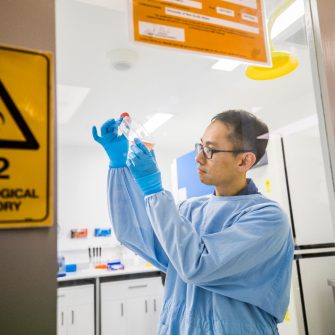Graduate Certificate in Food Science
- Commencing Terms
- Term 1, 2 & 3
- Duration
- 1 year F/T, 2 Years P/T
- Delivery Mode
- Face-to-face (includes blended)
- Campus
-
Kensington
- Codes
- Program code 7037
-
2025 Indicative first year full fee
- $44,000*
-
2025 Indicative full fee to complete degree
- $44,000*
-
2025 Indicative first year full fee
- $58,000*
-
2025 Indicative full fee to complete degree
- $59,000*


UNSW is introducing a new academic calendar from 2028.
What does this mean for my studies? UNSW is moving to a new ‘flex-semester’ calendar.
- Overview
- Entry requirements
- What will I study?
- Future careers
- How to apply
- Fees & Scholarships
Overview
The Graduate Certificate of Food Science is designed for graduates from related disciplines wishing to advance their knowledge and skills in this area. In this program you'll develop your technical knowledge and ability to analyse food science problems and gain a deeper understanding of the agrifood business, in addition to meeting or maintaining professional accreditation standards and furthering your career opportunities.
Our courses provide strategies and tools to increase efficiency and performance, and the chance to learn alongside like-minded industry professionals. The Graduate Diploma also provides a pathway towards the Master of Food Science.
Why study at UNSW?
When you study with UNSW you'll be studying at a global top 20 university (QS World University Rankings, 2025), that is recognised in Australia and abroad for teaching and research excellence.
We're ranked #1 in Australia and #25 globally for Engineering and Technology. All eight of UNSW's Engineering schools are ranked in the global top 50 with two schools ranked in the global top 10 for Engineering subjects (QS World University Rankings by Subject, 2025).
UNSW is known for its graduate employability, with UNSW awarded the Most Employable students for six years in a row (Australian Financial Review (AFR) Top100 Future Leaders Awards, 2020-2025).
This program allows you to develop your knowledge and skill related to the food industry.
Want to see more from UNSW Engineering?
Entry requirements
Admissions to the standard 1 year program requires the following:
- A minimum AQF Level 7 undergraduate qualification per the Australian Qualifications Framework in a cognate discipline with a minimum 65% average.
Cognate disciplines |
|
|
|
Recognition of Prior Learning (Credit Transfer)
UNSW recognises that many students have professional experience or relevant previous studies. If you have worked in a relevant industry or have relevant previous study experience, you may be eligible for credit points that would enable you to accelerate your Graduate Diploma in Engineering Science in an option listed below dependent on your previous study and experience.
English language requirements
You may be asked to provide evidence of your English proficiency to study at UNSW depending on your educational background and citizenship. English language skills are vitally important for coping with lectures, tutorials, assignments and examinations - this is why UNSW requires a minimum English language competency for enrolment.
If you’re completing an Australian Year 12 qualification (e.g. NSW HSC or equivalent), you do not need to provide anything extra to prove your proficiency. Your qualification will be used as evidence of your English proficiency.
If you do need to provide evidence of your English proficiency, this will be indicated in your application. You can prove this by providing evidence that you meet one or more of the following criteria:
- English language tests and university English courses
- Prior study in the medium of English
- Other qualifications
If you need to improve your English skills before you start your degree, UNSW College’s Academic English Programs are for you. The programs are suitable for various English levels and help you prepare for university studies and life in Australia.
For more details, visit the English Language Requirements page.
Admissions to the standard 1 year program requires the following:
- A minimum AQF Level 7 undergraduate qualification per the Australian Qualifications Framework in a cognate discipline with a minimum 65% average.
Cognate disciplines |
|
|
|
Recognition of Prior Learning (Credit Transfer)
UNSW recognises that many students have professional experience or relevant previous studies. If you have worked in a relevant industry or have relevant previous study experience, you may be eligible for credit points that would enable you to complete your Master of Engineering Science in as little as one year, or another accelerated option listed below dependent on your previous study and experience.
English language requirements
You may be asked to provide evidence of your English proficiency to study at UNSW depending on whether you are from an English-speaking background or non-English speaking background. English language skills are vitally important for coping with lectures, tutorials, assignments and examinations - this is why UNSW requires a minimum English language competency for enrolment.
If English is not your first language, you’ll need to provide proof of your English proficiency before you can be given an offer to study at UNSW. You can do this by providing evidence that you meet one or more of the following criteria:
- English language tests and university English courses
- Prior study in the medium of English
- Other qualifications
If you need to improve your English skills before you start your degree, UNSW College’s Academic English Programs are for you. The programs are suitable for various English levels and help you prepare for university studies and life in Australia.
For more details, visit the English Language Requirements page.
Check the specific English language requirements for this program
What will I study?
Full program structure
In the Graduate Certificate in Food Science you'll study subjects including:
- Food Products and Ingredients Technology
- Food Safety and Quality Assurance
- Food Properties and Functions Laboratory
- Food Processing Principles
- Nutrition
- Advanced Food Engineering
- Food Microbiology
- Pharmaceutical Design and Engineering
- Advanced Food and Health
Future careers
- Food safety
- Nutritionist
- Food engineering
- Product design
How to apply
Applications must be submitted through our Apply Online portal. We encourage you to submit your completed application as early as possible to ensure it will be processed in time for your preferred term. Some high-demand programs and Faculties with limited places may have an earlier application deadline or commencement date. Find out more.
Ready to start your application?
For most international students, applications are submitted via our Apply Online, opens in a new window service. We encourage you to submit your completed application as early as possible to ensure it will be processed in time for your preferred term.
Some high-demand programs with limited places, may have an earlier application deadline or may have an earlier commencement date. For more information visit our international applicant information page.
Ready to start your application?
Fees & Scholarships
Full Fees are the cost of the degree for students who do not receive a CSP place.
*Fees are subject to annual review by the University and may increase annually, with the new fees effective from the start of each calendar year. The indicative fees listed here are based on an estimated average and are for tuition only other fees and charges are not included. The amount you pay will vary depending on the calendar year to enrol, the courses you select and whether your study load is more or less than 1 Equivalent Full Time Student Load (8 courses per year). Indicative fees are a guide for comparison only based on current conditions and available data. You should not rely on indicative fees. More information on fees can be found at the UNSW fees website
Indicative fees to complete the program have been calculated based on a percentage increase for every year of the program. Fee increases are assessed annually and may exceed the indicative figures listed below.
*Fees are subject to annual review by the University and may increase annually, with the new fees effective from the start of each calendar year. The indicative fees listed here are based on an estimated average and are for tuition only, other fees and charges are not included. The amount you pay will vary depending on the calendar year to enrol, the courses you select and whether your study load is more or less than 1 Equivalent Full Time Student Load (8 courses per year).
Indicative fees are a guide for comparison only based on current conditions and available data. You should not rely on indicative fees. More information on fees can be found at the UNSW fees website.
Indicative fees to complete the program have been calculated based on a percentage increase for every year of the program. Fee increases are assessed annually and may exceed the indicative figures listed here.
Indicative fees to complete the program include tuition plus an estimate of study-related costs of approximately $1,000 per year. To find out more about other costs, visit UNSW International.
Scholarships
At UNSW, we award over $83 million in scholarships each year. We pride ourselves on rewarding excellence and making university accessible to students from all walks of life. Whether you’re a domestic or international student, our range of scholarships, prizes and awards can support your journey.

QS World University Rankings, 2025

AFR Top100 Future Leaders Awards, 2020-2025

#1 Australian uni attended by start-up founders




